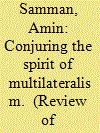| Srl | Item |
| 1 |
ID:
144055


|
|
|
|
|
| Summary/Abstract |
In recent years, critical scholars have emphasised how the recollection of past events as traumas can both constrain and widen the political possibilities of a present. This article builds on such research by suggesting that the management of contemporary financial crises is reliant on a ritual work of repetition, wherein prior ‘crisis’ episodes are called upon to identify and authorise specific sites and modes of crisis management. In order to develop this argument, I focus on how past crises figure within the public pronouncements of four key policymaking organisations during the financial instability of 2007–9. I find that while the Great Depression does enable these organisations to reaffirm old ways of managing crises, both it and the more recent Asian crisis are also made to disclose new truths about the evolution of multilateralism as a form of governance. In so doing, I argue, these historical narratives reveal how the management of global financial crisis depends upon a kind of ‘magic trick’. Rather than a strictly rational, historical process of problem solving, contemporary crises are instead negotiated through a contingent and self-referential conjuring of crisis-histories.
|
|
|
|
|
|
|
|
|
|
|
|
|
|
|
|
| 2 |
ID:
133548


|
|
|
|
|
| Publication |
2014.
|
| Summary/Abstract |
The past does not simply provide conditions of possibility for capitalist finance; it also serves as a vital resource for those who might seek to understand or negotiate it in a particular present. However, scholars of finance and crisis have overlooked this point at precisely the same time that they themselves have sought to find clues or lessons in financial history. This article provides a reading of how and why the past has come to acquire such a strange presence within contemporary capitalism. Following Michel de Certeau, it approaches historiography as an operation, focusing on how the past has figured within three distinct but related fields of social science - namely, financial economics, economic history, and constructivist political economy. It demonstrates how each of these fields has been structured around an exclusion of the recollected past as an input into historical process, and argues that this has been revealed by the discursive response to the crisis of 2008, which in turn should be understood as a breakdown in the machinery of capitalist historiography. It concludes by suggesting that, in order to grasp the potential productivity of such a breakdown, scholars of the global economy should begin to make a place for 'the practical past' within both their visions of history and their methods of historical research.
|
|
|
|
|
|
|
|
|
|
|
|
|
|
|
|